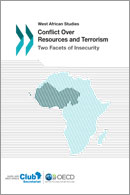Conflict over Resources and Terrorism: Two Facets of Insecurity
 |
OECD West African Studies, April 2013 This study proposes a diverse set of contributions to the debate on conflict and instability in West Africa. They try to avoid the commonly used simplified explanations often adopted by politicians. As Paul Valéry said, “What is simple is always false”. However, he added, “What is not, is unusable”. The study first analyses an old and recurring form of instability in the region: conflict over resources. A series of case studies will examine the causes of these conflicts with reference to the associated regional challenges and response tools. Secondly, the study addresses terrorism, a relatively new dimension of insecurity. It outlines the development of AQMI and Boko Haram and then focuses on a comparative analysis of legal mechanisms to fight against terrorism. The argument holds that the congruence of these insecurities and the current violent crises present an unprecedented risk of destabilisation for West Africa and the international community.
|
Contents
Part I - Conflict over resources
Part II - Terrorism
Chapter 1 - Environmental and security parameters
The notion that climate change breeds violence is prevalent. Several schools of thought focus on the relationship among resources, confl ict and security. Eco-violence theory argues that resource scarcity is linked to violent confl ict. However, many researchers dispute this argument because no consensus exists in terms of factual evidence and quantitative research in this area (for example, between drought and violent confl ict). Combined with other parameters, indirect effects may be detectable through intermediate channels, particularly in the case of small-scale violent confl ict, such as in the confl icts between farmers and herders in arid and semi-arid areas. This chapter examines if such a relationship exists with the help of relevant case studies. > read
Chapter 2 - Land conflicts
The definition adopted for land conflicts includes territorial conflicts and conflicts over the use of mineral and forest resources. Three types of violent land confl icts are identifi ed and analysed for West Africa: agro-pastoral confl icts, inter-communal agrarian struggles, and forest frontier confl icts. Policy and judicial administration weaknesses appear to be the main risk factors. Climate change does not appear to be a possible driver of confl ict, and in West Africa few violent confl icts are linked to expropriation and enclosure. However, current large-scale land acquisition without supervision is a pressing challenge for countries and regional organisations. > read
Chapter 3 - Agro-pastoral tensions
West Africa is a “zone of instability” in particular because of long-running tension between sedentary farmers and nomadic communities. These two groups have for a long time co-existed in a complementary way, sharing the same ecological niche and common pool resources. This relationship is now weakened by competition and confl ict. This is a result of several factors, which include changing demographic, social, political, and environmental conditions. The tension threatens peace and regional security. The formal mechanisms of conflict resolution have thus far not succeeded. A number of factors (the proliferation of small arms and light weapons, poor regulatory mechanism for arms and ammunitions, upward trends in population density) will continue to heighten agro-pastoral tensions and other forms of confl ict in the region and beyond. > read
Chapter 4 - Analysis of the crisis in northern Mali
As the international community debates military intervention into northern Mali, the need to understand the causes of the crisis and the groups that have perpetuated it have never been more urgent. This chapter1 provides a diagnosis of the crisis in northern Mali and discusses the policy challenges and risks the international community faces in reaching a resolution. It argues that Bamako’s loss of control over the north is due to longstanding socioeconomic grievances among the Touareg, compounded by complex new threats and developments. The exploitation of the Touareg rebellion by radical Islamist terrorist groups presents a unique and complex challenge not only to Mali but also to the wider region. As military intervention looms, so too does the prospect of protracted confl ict that will very likely affect the entire region. Planning will need to look beyond short-term responses to the crisis: sustainable security will depend upon sustainable development. > read
Chapter 5 - Boko Haram: A new threat in West Africa
This chapter discusses the political, economic and religious factors that gave rise to Boko Haram, the most active terrorist group in Nigeria. It argues that Boko Haram’s tactics may be evolving from a locally focused insurgency to transnational terrorist activities, and that the movement poses a growing threat to neighbouring countries, particularly Mali and Niger. The Nigerian government’s failure to address socio-economic marginalisation, combined with heavy-handed counter-terrorism measures has hindered efforts to end the Islamist-led insurgency in the north. Nigeria’s experience and Boko Haram’s dramatic escalation of violence, provides lessons for other countries about the need to understand and tackle this new and evolving threat. Boko Haram embodies a growing regional security challenge that requires a coordinated regional response, including joint security initiatives and shared commitment to development and governance in vulnerable areas. > read
Chapter 6 - Applying anti-terrorism mechanisms
The majority of international and regional organisations recognise numerous anti-terrorism conventions and initiatives. However, serious challenges remain with respect to the application and enforcement of national legislation and the co-ordination of states. Terrorism is a contentious concept in international law, making it diffi cult to create the consensus required to implement effective measures at the international level. Notwithstanding this lack of consensus, the severe problems terrorism causes for West Africa in terms of security, and hence development, demand an effective response that encompasses prevention and punishment. These considerations imply the passing of appropriate anti-terrorism legislation, insofar as it is the law that provides the overall framework for the fi ght against terrorism. > read
Related Documents
- Topics

